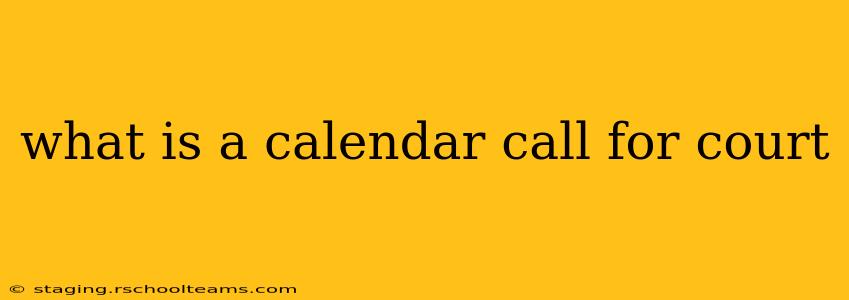What is a Calendar Call for Court?
A calendar call, often referred to as a scheduling call or pre-trial calendar call, is a routine court proceeding where judges or court clerks review the status of pending cases. It's not a full-blown hearing where evidence is presented or arguments are made. Instead, it's a procedural step designed to manage the court's docket and keep cases moving efficiently toward resolution. Think of it as a crucial organizational step in the judicial process.
What happens during a calendar call?
The specifics vary by jurisdiction and court type, but generally, a calendar call involves the following:
- Case Review: The judge or court clerk reviews each case listed on the calendar. This often involves checking the case file for recent filings, such as motions or discovery responses.
- Status Update: Attorneys representing the parties may be required to provide a brief oral update on the case's progress. This might include reporting on ongoing settlement negotiations, the status of discovery, or upcoming trial readiness.
- Scheduling Conferences: The calendar call is frequently used to schedule future hearings, such as pre-trial conferences, mediation sessions, or the actual trial date. This is a key function of the call—to coordinate schedules and ensure timely progression of the case.
- Case Management: Judges use calendar calls to identify potential roadblocks or issues that might delay the case and take steps to resolve them. This might involve setting deadlines for specific tasks or addressing procedural disputes.
- Setting Deadlines: Deadlines for filing motions, completing discovery, or other procedural requirements are often established or confirmed during the calendar call.
What are the purposes of a calendar call?
The primary purposes of a calendar call are:
- Efficient Case Management: To streamline the judicial process and prevent case backlogs.
- Early Dispute Resolution: To identify and address potential obstacles early on, potentially leading to faster resolution.
- Scheduling Coordination: To efficiently schedule future hearings and ensure all parties are available.
- Judicial Oversight: To provide judges with regular updates on the status of pending cases and maintain control over the court's docket.
Why might my case be on a calendar call?
Your case will likely be on a calendar call if it's a civil or criminal case that's still in the pretrial phase. The court uses calendar calls to monitor the progress of all its active cases and ensure they are moving toward resolution.
Who attends a calendar call?
Typically, attorneys representing the parties involved in the case attend the calendar call. In some instances, the parties themselves might be required to appear, although this is less common. The judge or a court clerk presides over the call.
What if I miss a calendar call?
Missing a calendar call can have significant consequences. It could lead to sanctions from the court, such as fines or delays in your case. It’s crucial to be aware of any calendar call dates provided by the court and to attend or have your attorney attend as required.
Can a calendar call be waived?
In some instances, a calendar call may be waived by the court, particularly if the case is progressing smoothly and requires no further court intervention at that point. However, this is not always the case, and the court’s rules will govern whether a waiver is possible.
By understanding the nature and purpose of a calendar call, parties involved in legal proceedings can better navigate the judicial process and contribute to the efficient administration of justice. Remember, it's a procedural step vital to the timely resolution of cases.
